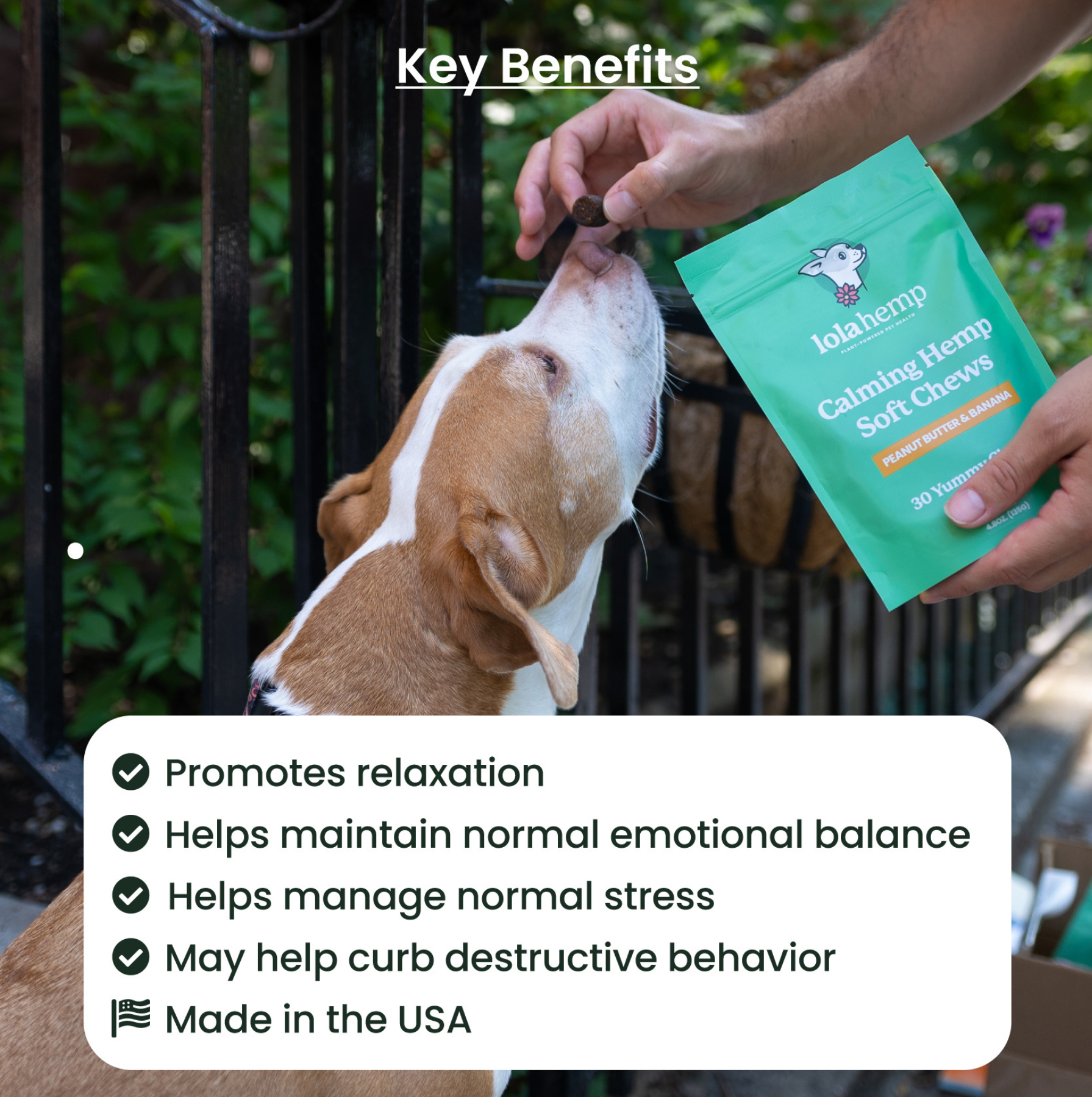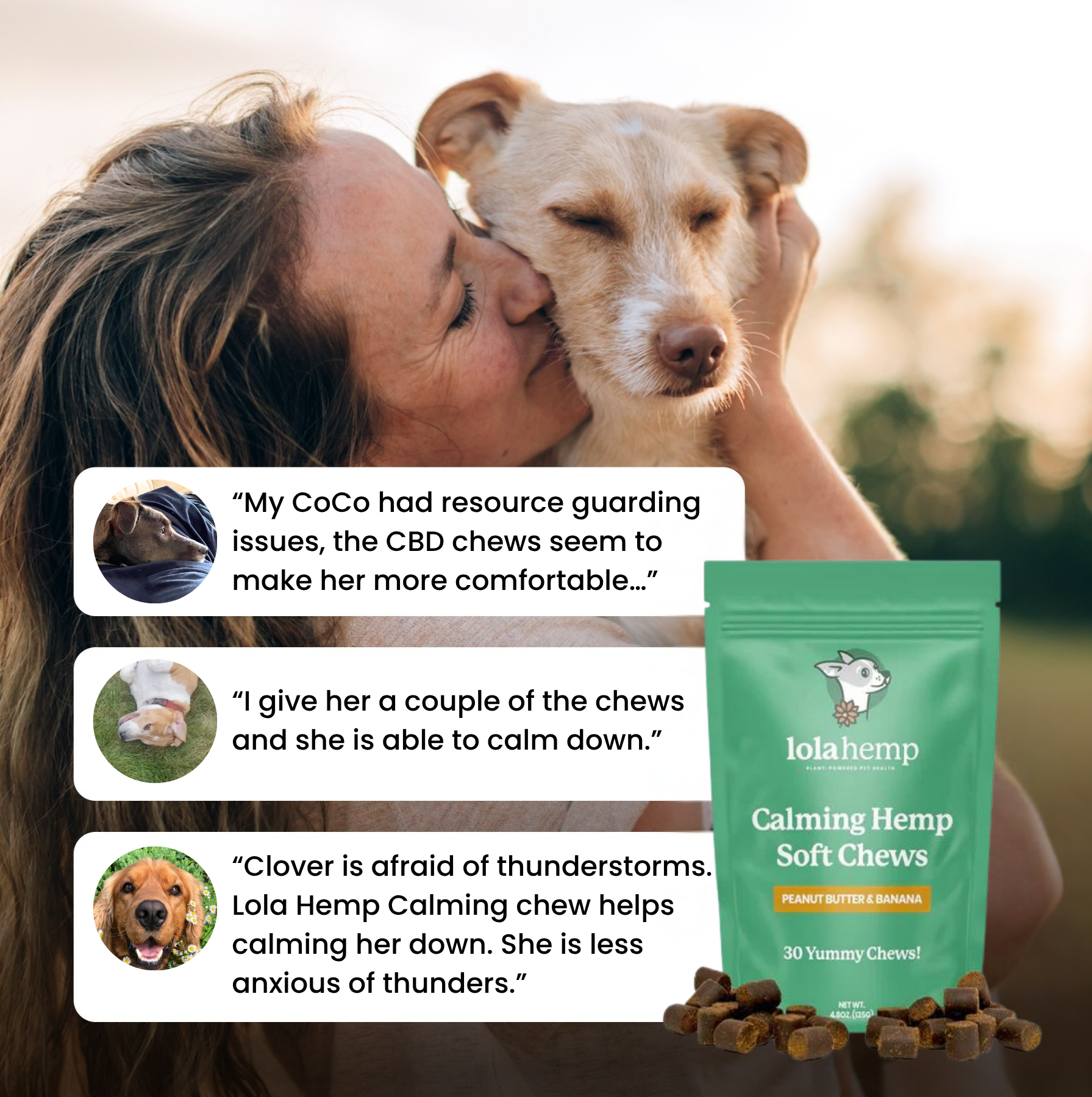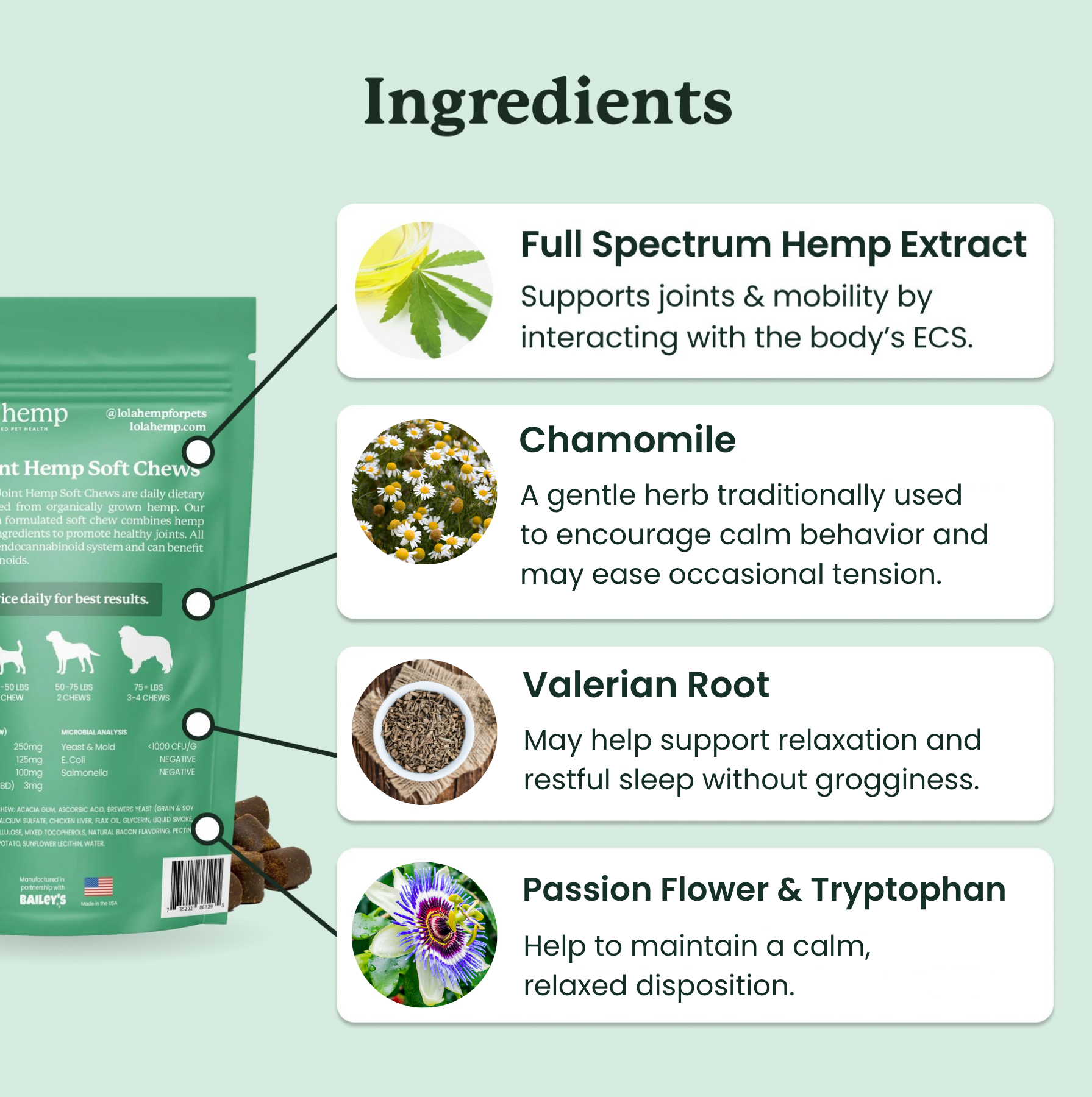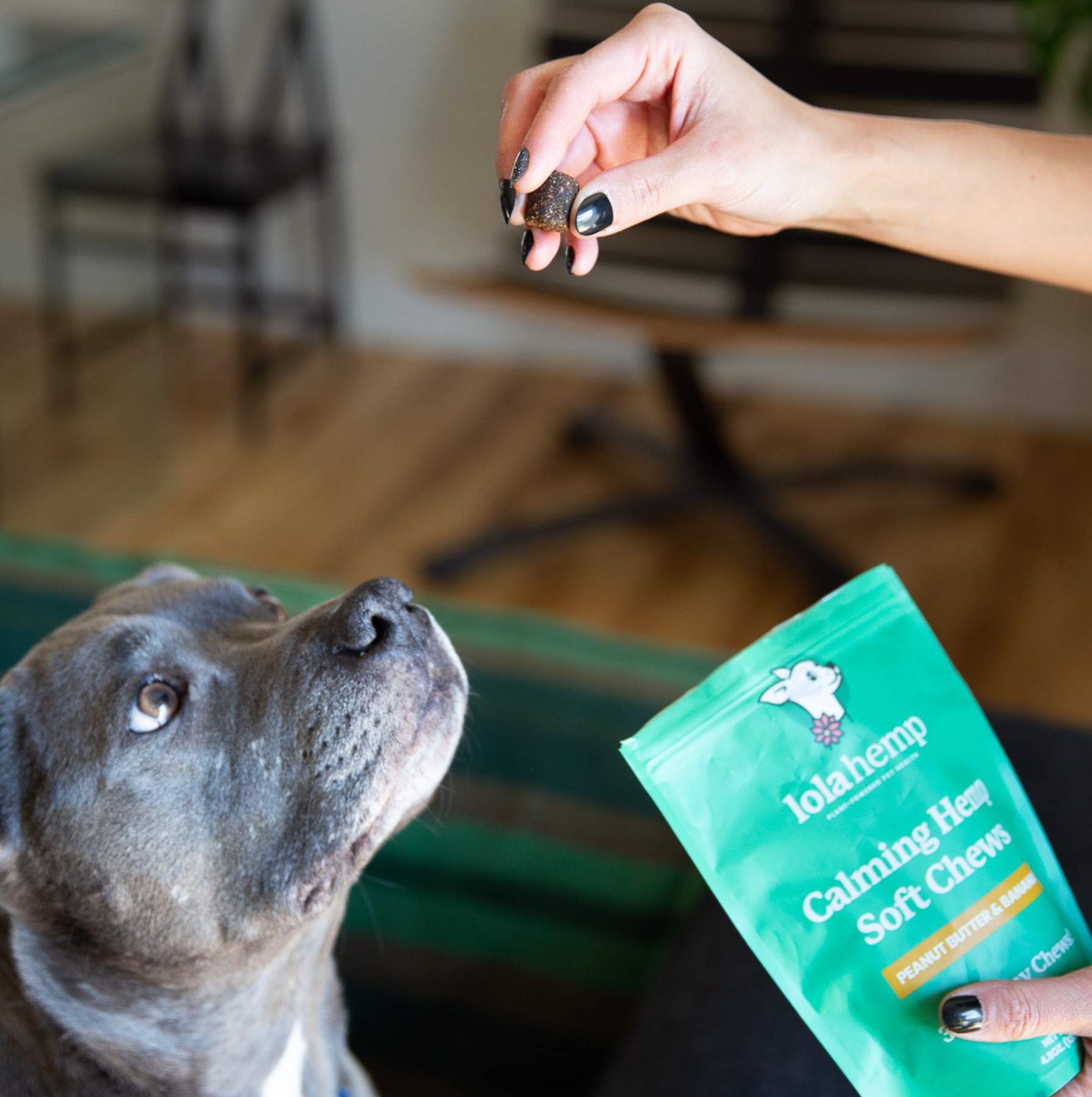We've all heard the saying: dogs are man's best friend. But, sometimes, life situations or unforeseen challenges can lead dog owners to face the heart-wrenching decision of rehoming their beloved furry companion.
At Lolahemp, we deeply understand the bond between a pet and its owner, and we are here to offer guidance and support during these trying times. If you're grappling with the decision to rehome due to your dog's aggressive behavior, or other behavioral issues, we're here to help.
This article discusses rehoming a dog with behavioral issues. This is a heavy decision for any dog lover, and we hope to provide some helpful information and potential ways to calm your dog and relieve some of the issues they're presenting.

CBD oil may help address some of the underlying issues of your pet's behavioral challenges. Full-spectrum hemp has helped thousands of dogs relax, remain calm, and become more receptive and less distracted during training.
Try CBD Oil for Your Dog- Reasons Why People Give Up Their Dog
- Should I Give Up My Aggressive Dog?
- What Do No-Kill Shelters Do With Aggressive Dogs?
- How Do Dogs Feel About Rehoming?
- We All Need To Feel Safe At Home
- Should Aggressive Dogs be Rehomed?
- Serious Dog Behavior Issues
- Contact The Shelter Or Breeder You Adopted From
- How to Rehome Your Dog Responsibly
Reasons Why People Give Up Their Dog
Many dog owners arrive at the tough decision of rehoming their dog for a variety of reasons.
For some, it might be due to the dog's aggressive behavior towards other pets, while others might face challenges like health problems, relocation, or financial constraints. It's essential to remember that every dog owner's circumstances are unique, and it's crucial to make an informed decision that best suits both the pet and its family members.
A common reason for rehoming is dog aggression. Pet owners may wonder if behavioral struggles come from a dog's environment, whether it's a breed-specific issue, or something else. It's important to remember these factors when you're making your decision, but at the end of the day the safety of a family member or the peace of mind of your loved ones has to be a priority.
This is especially true when considering a bite incident. So, while it's an incredibly serious thing to rehome a dog, there are a number of reasons that people consider doing it. Some of us don't have the behavioral training skills to adjust a dog's behavior, and some animals simply require more skill and attention in order to correct dangerous behaviors.
Should I Give Up My Aggressive Dog?
It's a difficult decision to rehome an aggressive dog. Aggressive dogs might display behaviors like dog bites or resource guarding, which can be concerning, especially if there are small children in the home environment. You may decide to try a calming supplement for anxious-aggressive dogs and see if that helps.
However, before deciding, consult with a certified professional dog trainer or behavior consultant. They can offer insights into behavior modification techniques and whether rehoming is the only option.
What Do No-Kill Shelters Do With Aggressive Dogs?
No-kill shelters work tirelessly to ensure most dogs, including those with behavioral problems, find loving homes. They often collaborate with dog trainers and behavior consultants to address and correct the dog's aggressive behavior.
If rehabilitation isn't possible, these dogs might be placed in a foster home environment where their unique needs can be met. No-kill shelters are essential because many dogs who are sent back to the animal shelter are unable to be cared for.
This isn't necessarily the fault of the local humane society. Instead, shelters must put some animals down because there simply isn't the space or resources to care for them.
No-kill shelters are dedicated to caring for all animals that come through their doors, which is why rehoming an aggressive dog should include sending them to a no-kill shelter.

How Do Dogs Feel About Rehoming?
Dogs are emotional creatures. While not all dogs may understand the intricacies of the rehoming process, they can sense changes in their environment.
Some dogs might feel anxious or display destructive behaviors. However, with patience, love, and mental enrichment from their new owners, many dogs adjust well and thrive in their new homes.
It's hard to know exactly how a dog is feeling when it finds a new home, and most dogs will likely respond differently. That's why it's important to pay special attention to the unique behaviors and emotions that the dog in your life displays.
We All Need To Feel Safe At Home
Absolutely adorable as our four-legged friends might be, it's essential that every family member, including other pets, feels safe. Sometimes, it's a responsible choice to consider rehoming if a dog's aggressive behavior poses a threat to the well-being of others.
If you're unsure if a family member, child, or existing pet is unsafe around your new dog, that's definitely a reason to think about taking action. Whether that means finding an animal behaviorist or rehoming your dog quickly is up to you.
In each case, though, it's important to remember that your dog is not simply a "bad dog" because they're displaying aggressive or unacceptable behaviors. Dogs, like us, are driven by their previous experience, genetics, environmental factors, and more.
This is all to say that you should remember to use care and compassion when thinking through this difficult process.

Should Aggressive Dogs be Rehomed?
Rehoming an aggressive dog is a challenging but not impossible task.
Not all dogs with a bite history or aggression towards other animals are unsuitable for new families. It's vital to screen potential adopters in person, ensuring they're equipped to manage the dog's behavior issues.
The Canine Journal offers excellent resources on this topic.
Serious Dog Behavior Issues
Some dogs might suffer from more severe behavioral issues, which can be a result of traumatic experiences or lack of early socialization. Dog lovers should be aware that while many dogs can be rehabilitated, behavioral euthanasia is a heartbreaking reality in some cases.
If your dog is displaying serious behaviors that are causing significant issues, do your best to research different rescues or missions that house dogs displaying the behaviors that yours is.
Contact The Shelter Or Breeder You Adopted From
Before deciding on rehoming, always get in touch with the shelter or breeder you adopted your dog from. They can provide guidance, support, or even help in the rehoming process.
How to Rehome Your Dog Responsibly
Rehoming your dog is a grave responsibility. It's not just about finding a new owner but ensuring that the new family is the right fit.
Work with reputable rescue organizations or local humane societies to ensure a smooth transition. For detailed guidance, AKC's Expert Advice is a fantastic resource.

Rehoming an Aggressive Dog: Frequently Asked Questions
How do you know when it's time to rehome your dog?
It's time when the dog's needs surpass what the owner can provide, or there's a consistent threat to the safety of other family members.
Do dogs cope with rehoming?
Most dogs, given time and love, adjust well to new environments and families.
What do you do when you can't cope with your dog anymore?
Seek advice from professionals like dog trainers, vet hospitals, or local shelters.
Can I rehome my aggressive dog?
Yes, with proper precautions and by ensuring the new family understands and can manage the dog's aggression.
Can an anxious dog be rehomed?
Anxious dogs can be rehomed with families equipped to provide a stable environment and patience.

For those exploring options to calm their pets during this transition, our Lolahemp CBD tincture might be a beneficial addition. As always, remember to consult with a veterinarian before introducing any new products to your dog's routine.
Navigating the terrain of rehoming can be challenging. But with the right resources, guidance, and a lot of love, both you and your dog can find peace and happiness.










Comments
I have a 3 year old Yorkshire terrior cross bichon, he is very aggressive on times and has tried to bite me several times, if you tell him to do something (which milo don’t like to be told what to do)he tries to attack you,I have several young grandchildren and babies that spend a lot of time at my home,milo tried to attack my granddaughter the other day,I have rang several centers and no help.i really need to rheometer milo before he hurts one of the children, please can you help me
I have a 3year Yorkshire terrior cross bichon,he is loving most of the time but for the last 13 months he is getting more aggressive even trying to bite and attack us he is even turning on my young grandchildren, please help us
I need to rehome my 3 1/2 year old shepherd mix. His name is Mick. He displays aggression and reactivity on the leash. He bit a child once when he got pinned against a building by the child’s bike. He also has gastrointestinal issues and allergies which mean that he has to be on specialized food and medication. I have an appointment to euthanize him on September 27th if no one wants to give him a new, peaceful home.
My dog is very aggressive to anybody that comes toward the house when you’re out in a car he’s aggressive don’t want to play around you he’s a 80 lb Pitbull that’s loving thing in the world in the house but people outside this house you can walk him he don’t bother nobody you can enjoy being with the park with him nobody but if you come up on this porch he’s going to bite them what can I do
I need to re home my dog. I have been watching her for my brother. She keeps running out door. Today she attacked another dog. She is so good with kids and family. I really need help please. I may loose my home
I would like to rehome my 2 1/2 year old Cockerpoo, he has become aggressive towards me and bitten me 5-6 times drawing blood, I keep giving him a second chance but to no avail, 95%of the time he is a lovely obedient dog , loved by my wife and myself, but l can’t trust him anymore. Can you help?
I would like to rehome my 2 1/2 year old Cockerpoo, he has become aggressive towards me and bitten me 5-6 times drawing blood, I keep giving him a second chance but to no avail, 95%of the time he is a lovely obedient dog , loved by my wife and myself, but l can’t trust him anymore. Can you help?
I would like to rehome my 2 1/2 year old Cockerpoo, he has become aggressive towards me and bitten me 5-6 times drawing blood, I keep giving him a second chance but to no avail, 95%of the time he is a lovely obedient dog , loved by my wife and myself, but l can’t trust him anymore. Can you help?
I would like to rehome my 2 1/2 year old Cockerpoo, he has become aggressive towards me and bitten me 5-6 times drawing blood, I keep giving him a second chance but to no avail, 95%of the time he is a lovely obedient dog , loved by my wife and myself, but l can’t trust him anymore. Can you help?
I must re-home him today before I must put down because he good with adults and some children but aggression towards other animals and people that argue or not have good attention and he bit two people that try to stop him from attacking there animals.i need a place for him today